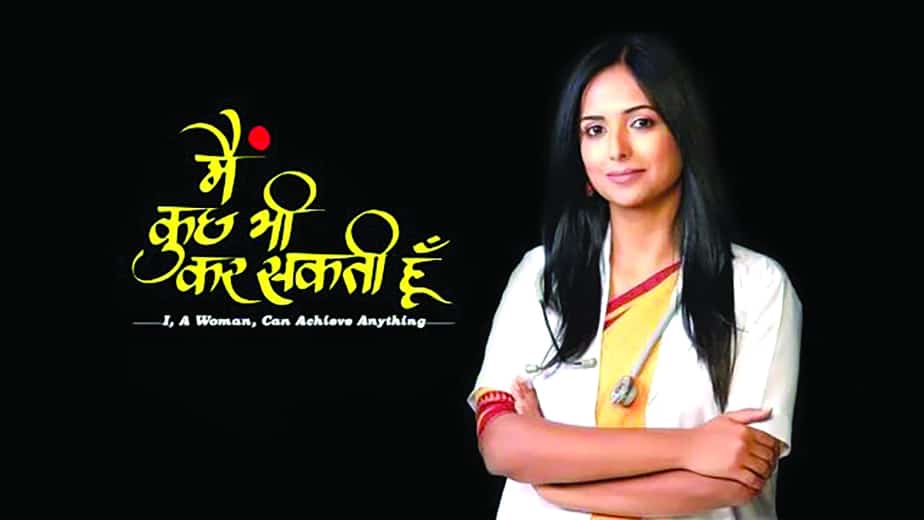
Main Kuch Bhi Kar Sakti Hoon( (“I, a woman, can achieve anything”). The popular show on DD National, that has this name has become the country’s first television show to employ an Artificial Intelligence chatbot to reach a younger audience more effectively.
The show is powered by Population Foundation of India and the Dr Sneha chatbot (based on the protagonist of the show) allows users to have a closer interaction with the series and more importantly, to the issues related to sexual and reproductive health.
Main Kuch Bhi Kar Sakti Hoon revolves around the inspiring journey of Dr Sneha Mathur, a young doctor, who leaves behind her lucrative career in Mumbai to work in her village. The show focuses on Dr Sneha’s crusade to ensure the finest quality of healthcare for all. Under her leadership, village women find their voices through collective action.
Poonam Muttreja, Executive Director of Population Foundation of India, says that the chatbot allows young women to embark on a “safe journey,” to create a community of “healthy young people who are aware” of their circumstances and their options. Muttreja stresses that 52% of young pregnant women in India are aged 15-19 years. The Dr Sneha chatbot provides a platform to impart information to such girls, who even in early adulthood couldn’t possibly be clear on the pros and cons of contraception and reproductive health.
The target, says Muttreja, is to reach a rural and semi-urban demographic — to appeal to the first-generation digital media users. The link to the chatbot is displayed at the end of every episode, and the process link is provided on the Facebook page, so that users can access it any time they want. The chatbot is equipped with video series, stories and quizzes — all on the subject of sexual and reproductive health.
“Though young people have greater access to information through digital media, many of them are not able to discuss their needs or queries about sexual and reproductive health. They either get half-truths or explicit and misleading content that further confuses them,” she adds. This chatbot allows youngsters to talk about their concerns and get correct information from a reliable source, she confirms.
The Dr Sneha chatbot has been developed by UK-based company, AI for Good, led by Kriti Sharma. Kriti is a leading global Artificial Intelligence (AI) expert and UN Young Leader for the Sustainable Development Goals.
Sharma, the young lady behind the conception of this interface, says that the possibility of educating over 240 million people about a taboo subject, was what spoke to her the most. She says that AI brings forth the possibility of disseminating “trusted and engaging information to a large group of young people.”
Specialising in keeping bias out of AI, Sharma never thought her specific field of study would apply so heavily to the Dr Sneha project. “Just the way humans have biases — based on factors like gender or financial background — machines can learn it too.” She explains that such biases are reflected in algorithms. Since algorithms and machines make critical decisions like who gets a car loan or even who gets invited to a job interview, she stresses that removing such biases from the systems is imperative to avoid discrimination.
Sharma explains how they went about applying these rules for the Dr Sneha chatbot. “There is full transparency. The system doesn’t pretend to be human.” It is designed for young people who do not have adequate access to sex and health education. The diverse audience that the AI model of Dr Sneha is trying to reach was reflected in the data that was collected for the project from various backgrounds — different age groups, castes, classes and education levels.
She hopes that this aids the design community and policy makers to realise, “There are ways in which technology can be used to promote equality. We are also mindful of the need for privacy and confidentiality, for which we have adhered to the highest security standards, as we are dealing with the lives of young and vulnerable people,” she added.
The director and creator of the show, Feroz Abbaz Khan, sheds a little light on how a component like an AI chatbot is integrated into narrative. “Our attempt with the AI-powered chatbot has been to cover the last mile in education entertainment,” he says.
“While Main Kuch Bhi Kar Sakti Hoon has empowered women and children in rural India to question the status quo, the chatbot is to help them seek answers to their questions regarding sexual health in a non-judgemental environment through a user-friendly interface.”
He goes on to explain that in order to encourage its use, “We have created situations in the show where questions are being raised and the chatbot answers them. At a parallel level, a large number of questions being asked on the chatbot are being addressed in various episodes.”
At a time when AI is no longer regarded with suspicion, an initiative like the Dr Sneha chatbot could not have been more opportune. A subject like sexual and reproductive health still escapes being included in the regular school curriculum, spreading the impression that it is taboo. A non-judgemental portal equipped with information and free of biases, might be precisely the kind of awareness we need to cultivate.
The likely Rs 1,000 crore sale of the Tehri Garhwal House, former royal residence on…
On the principle of 'Sarvajan Hitaya, Sarvajan Sukhaya' -- Welfare for all, Happiness for all…
With hundreds reported missing in Delhi this year, this guide explains how families can use…
The case came to light after a 35-year-old woman from Panipat alleged that she had…
During the investigation, CCTV footage helped identify the suspects, according to Delhi Police
The launch took place during the inauguration of the Delhi Police Exhibition Hall at Connaught…